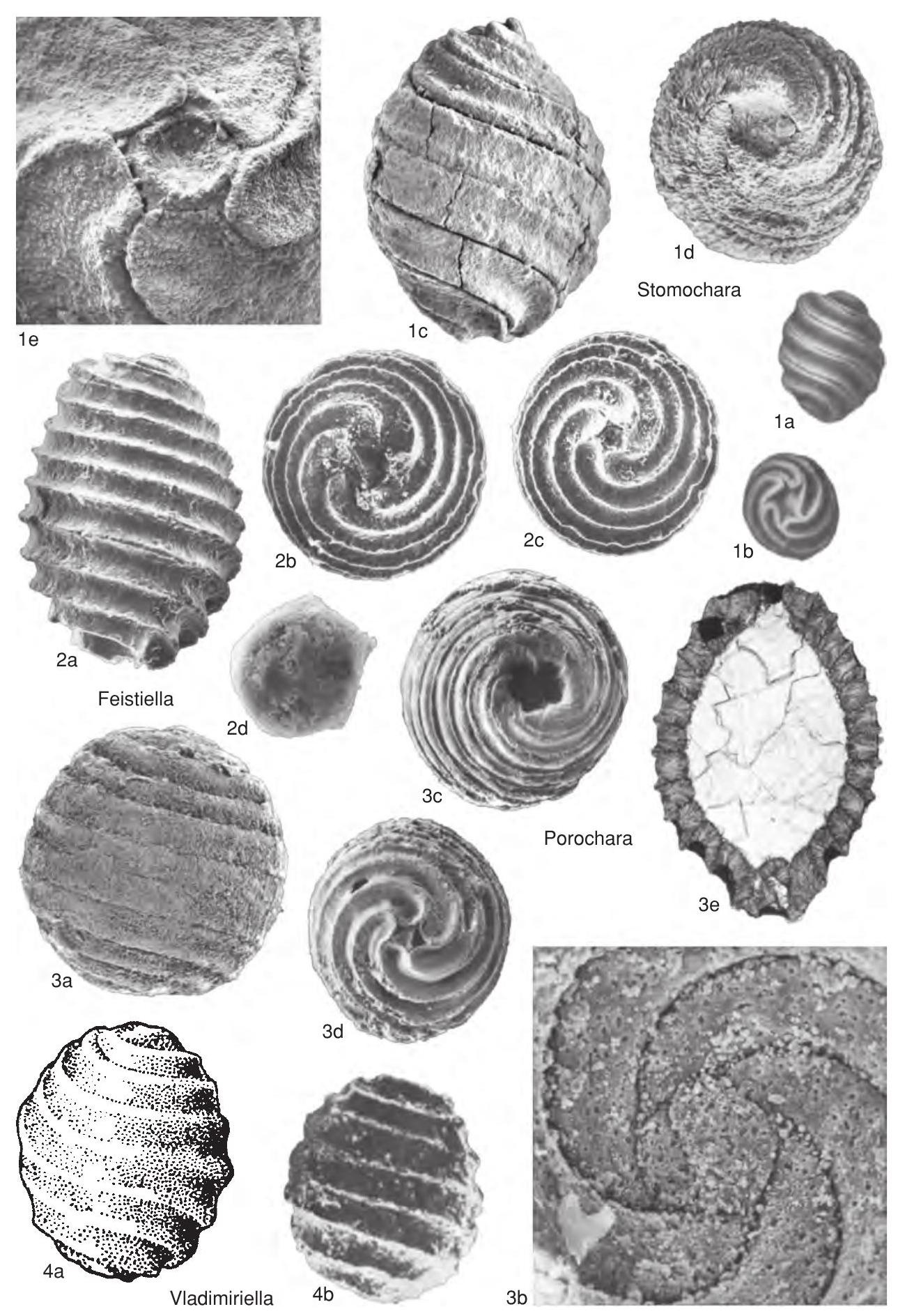Welcome to the Treatise on Invertebrate Paleontology!
Please enter a genera name to retrieve more information.

Porochara
Classification
Phylum:
Charophyta
Class:
Charophyceae
Order:
Charales
Suborder:
Charineae
Family:
Porocharaceae
Subfamily:
Porocharoideae
Formal Genus Name and Reference:
Porochara Mädler, 1955, p. 271, emend., SCHUDACK, 1986, p. 23
Type Species:
Aclistochara kimmeridgensis MÄDLER, 1952, p. 26, pl. B, 13-19, OD
Images
(Click to enlarge in a new window)
Fig. 50,3a-b. * P. kimmeridgensis (Mädler) Mädler, Kimmeridgian, Germany, a, topotype, lateral view, C.1234-1, x60 (new), b, paratype, multipartite basal plate from inside gyrogonite, x225 (Schudack, 1986, pl. 1,12)., Fig. 50,3c-e. P. (Musacchiella) douzensis (Feist & Grambast-Fessard) Schudack, Bathonian, France, c, apical view, x50, d, basal view, x50, e, longitudinal section, x54 (Feist & Grambast-Fessard, 1984, fig. 3B, 4C, 2A).
Synonyms
Euaclistochara, Jarzevaella, Musacchiella
Geographic Distribution
world-wide
Age Range
Beginning Stage in Treatise Usage:
upper Permian, Middle Jurassic
Beginning International Stage:
Aalenian
Fraction Up In Beginning Stage:
0
Beginning Date:
174.7
Ending Stage in Treatise Usage:
Lower Cretaceous, Paleogene (?Eocene)
Ending International Stage:
Priabonian
Fraction Up In Ending Stage:
100
Ending Date:
33.9
Description
Apical opening small to medium, spiral ends sometimes bending toward center of apical pore, basal plate multipartite, general shape varying from ellipsoidal to subglobular. Size variable. [SCHUDACK (1986) described multipartite basal plates in type specimens of P. kimmeridgensis, and thus Musacchiella became superfluous as a junior synonym. Species whose basal plates have been recognized as multipartite extend from the Bathonian to the Berriasian. In addition, species attributed to Porochara but without indications on basal plate morphology are provisionally maintained in this genus.]
References
Museum or Author Information
Classification
Phylum:
Charophyta
Class:
Charophyceae
Order:
Charales
Suborder:
Charineae
Family:
Porocharaceae
Subfamily:
Porocharoideae
Formal Genus Name and Reference:
Porochara Mädler, 1955, p. 271, emend., SCHUDACK, 1986, p. 23
Type Species:
Aclistochara kimmeridgensis MÄDLER, 1952, p. 26, pl. B, 13-19, OD
Images
(Click to enlarge in a new window)
Fig. 50,3a-b. * P. kimmeridgensis (Mädler) Mädler, Kimmeridgian, Germany, a, topotype, lateral view, C.1234-1, x60 (new), b, paratype, multipartite basal plate from inside gyrogonite, x225 (Schudack, 1986, pl. 1,12)., Fig. 50,3c-e. P. (Musacchiella) douzensis (Feist & Grambast-Fessard) Schudack, Bathonian, France, c, apical view, x50, d, basal view, x50, e, longitudinal section, x54 (Feist & Grambast-Fessard, 1984, fig. 3B, 4C, 2A).
Synonyms
Euaclistochara, Jarzevaella, Musacchiella
Geographic Distribution
world-wide
Age Range
Beginning Stage in Treatise Usage:
upper Permian, Middle Jurassic
Beginning International Stage:
Aalenian
Fraction Up In Beginning Stage:
0
Beginning Date:
174.7
Ending Stage in Treatise Usage:
Lower Cretaceous, Paleogene (?Eocene)
Ending International Stage:
Priabonian
Fraction Up In Ending Stage:
100
Ending Date:
33.9
Description
Apical opening small to medium, spiral ends sometimes bending toward center of apical pore, basal plate multipartite, general shape varying from ellipsoidal to subglobular. Size variable. [SCHUDACK (1986) described multipartite basal plates in type specimens of P. kimmeridgensis, and thus Musacchiella became superfluous as a junior synonym. Species whose basal plates have been recognized as multipartite extend from the Bathonian to the Berriasian. In addition, species attributed to Porochara but without indications on basal plate morphology are provisionally maintained in this genus.]
